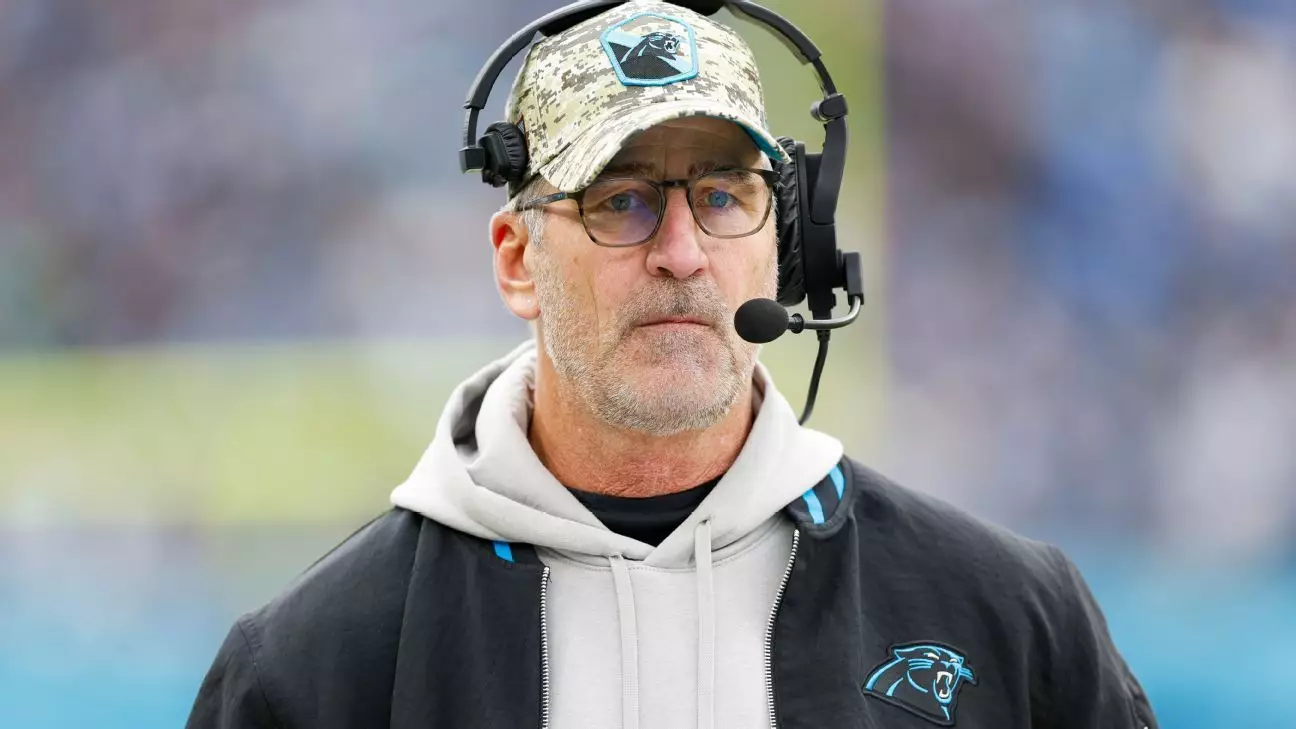In an astonishing yet predictable turn of events, Stanford University has decided to appoint Frank Reich, the seasoned NFL coach, as the interim manager of its beleaguered football team for the 2025 season. This shocking choice follows a series of allegations against former coach Troy Taylor, who was dismissed after being implicated in a toxic workplace environment characterized by bullying and inappropriate conduct. While Reich’s hiring could represent a glimmer of hope, it simultaneously underscores Stanford’s leadership failures and the pervasive issues that have plagued its athletic programs.
Reich’s appointment as interim head coach is more than just a strategic move; it’s part of a desperate attempt to stabilize a team that hasn’t seen a winning season since 2020. By agreeing to a one-year deal, Stanford and Reich have established an understanding that avoids any long-term implications or commitments. This temporary solution raises an unsettling question: Is this merely a band-aid over a festering wound? Stanford needs to craft a long-term vision, one that promotes integrity and a positive culture rather than just hopping from one interim coach to another.
Leadership and Legacy: A Misguided Search for Stability
The decision to elevate Nate Byham to the role of offensive coordinator only reinforces the apparent instability within the Stanford football program. By promoting a tight ends coach to a pivotal role in the wake of a dismal 3-9 record over the last four seasons, Stanford seems to be prioritizing internal continuity over substantial reform. The essence of a coaching overhaul—or any real change for that matter—often requires fresh perspectives unclouded by the weight of the existing culture. By encouraging the same coaching staff to carry on without a comprehensive vetting process, Stanford risks re-hashing mistakes that have already led to its decline.
Moreover, the school’s assault on traditional values extends beyond coaching changes. Frank Reich has had a spotty record as a head coach in the NFL, most notably losing his job at Carolina after just one season. Throwing him into the chaos at Stanford without the guarantee of long-term investment reveals a reactive rather than proactive approach by the university’s administration. Real leaders do not play hot potato with their head coaches or bring in figures with checkered pasts to manage their top programs. Rather, they create an environment that nurtures ongoing growth, inclusivity, and respect.
Failure to Promote a Positive Culture
Stanford’s football administration has exhibited a frightening failure to build a healthy environment, which directly contradicts the academic institution’s reputed values. Taylor’s departure came in the wake of serious misconduct allegations. The decisions made by the athletic department indicate a reluctance to genuinely confront toxic behaviors and improve the workplace atmosphere. When a university renowned for its academic excellence is overshadowed by bullying and intimidation, it raises numerous concerns about its priorities.
In this context, Rage pounding on the sideline seems like a parallel to the broader issues affecting the higher education landscape. Universities often overlook the mental and emotional wellbeing of student-athletes, prioritizing winning over holistic development. In short, Stanford must transcend their immediate football problems and reevaluate how they approach the coaching and overall athletic culture.
What Lies Ahead for the Cardinal?
Looking ahead, Stanford football remains a paradoxical enigma. With the announcement of David Bailey’s entry into the NCAA transfer portal—one of the program’s most promising talents—it’s evident that players are concerned with the current adaptive strategy. The impending search for a permanent athletic director only amplifies the uncertainty surrounding football operations. Valuing accountability and transparency at the department level will be crucial if Stanford is to regain respect on the field.
The momentum for transformational change is lacking, and the clock is ticking. Reich’s interim position should ideally be leveraged to promote significant shifts in culture, rather than serve the short-sighted interests of maintaining continuity. The harsh truth is that if Stanford wishes to rebuild its football reputation, it must embrace a more rigorous set of standards focused on player dignity, executive accountability, and authentic leadership. Anything less might relegate the Cardinal to unremarkable status within college football once again.


Leave a Reply